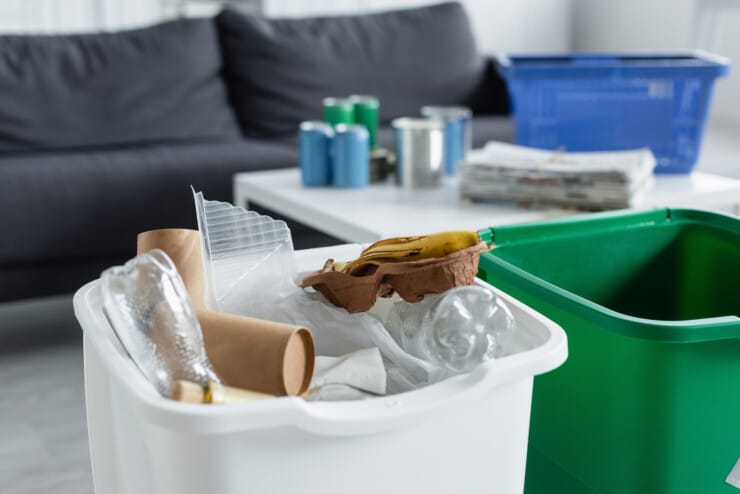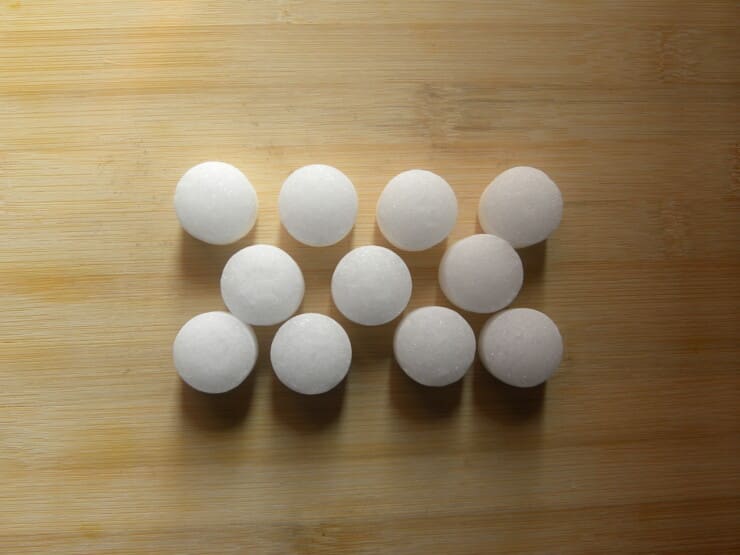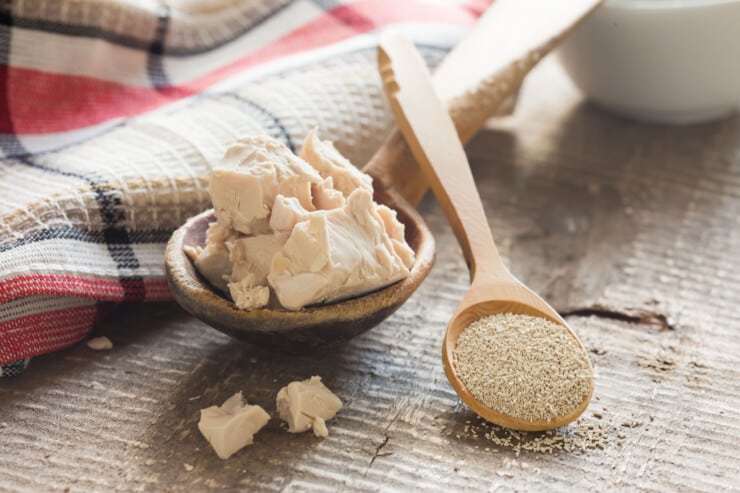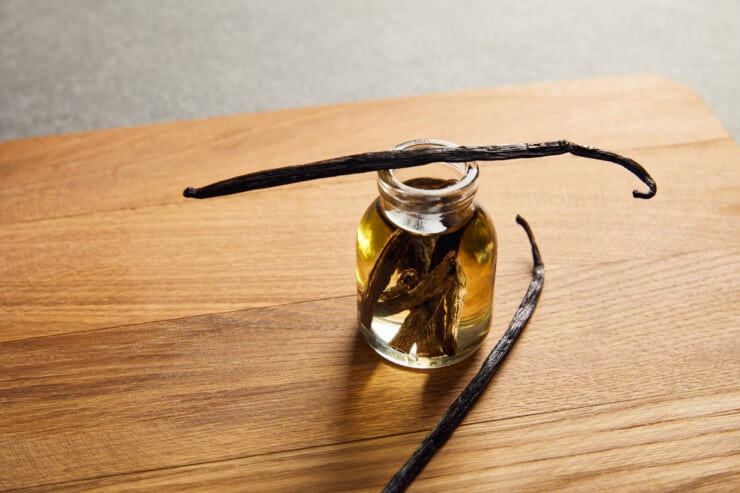Why is There a Strange Rotten Fruit Smell in My House?
Numerous homeowners have undoubtedly encountered the perplexity and exasperation of trying to pinpoint the origin of an odd stench of decaying fruit within their dwelling.
It’s natural for us to want our living spaces to be clean and welcoming, so when something doesn’t seem quite right, it can make us feel uneasy.
Understanding why there is a bizarre stench lurking around your abode is the first step towards regaining control over your environment.
In order to do that effectively, we need to delve into the various factors that could contribute to such smells permeating throughout your home.
Identifying The Source Of The Odor

The first step in solving the mystery of that strange rotten fruit smell is to track down its origin.
Odor origins can be tricky to pinpoint, as scents tend to waft and mingle throughout your living space.
To begin your search, follow your nose – literally!
Start by sniffing around common areas where fruits are typically stored, such as kitchen countertops or dining room tables.
If you’ve recently disposed of any spoiled produce, also check trash cans and recycling bins for lingering odors.
While it might seem obvious to look near fresh produce for odor sources, don’t forget about some unusual culprits that could be hiding in plain sight.
For instance, have you considered checking inside cupboards and cabinets?
It’s not uncommon for a forgotten piece of fruit to get pushed behind cans or boxes until it starts emitting an unpleasant aroma.
Additionally, take a peek under furniture like couches or beds; children (and even adults) may inadvertently stash snacks away only to forget about them later.
As you continue on this scent-sleuthing journey, remember that locating the source of foul smells isn’t always straightforward.
Sometimes the cause may be more elusive than simply finding a decaying apple or banana peel tucked away somewhere unexpected.
The key is persistence: keep investigating potential odor origins until you’re able to identify what’s causing that peculiar rotten fruit smell in your house – and then promptly address it so you can enjoy a fresher-smelling home once again.
Common Household Causes

Have you ever come home to be greeted by a mysterious, unpleasant odor? It’s not exactly the warm welcome you were hoping for.
Uncovering the source of that strange rotten fruit smell in your house can actually become an engaging experience, leading you on a path towards mastery over your living space.
Let’s begin by exploring some common household causes and empower ourselves with knowledge!
First off, hidden pests may be lurking behind that pungent stench.
Insects like fruit flies or ants are known culprits when it comes to infesting our homes and feasting on any food they can find.
These tiny invaders often hide out in dark corners, beneath appliances, or even inside walls – leaving their mark through decaying waste and breeding grounds that emit foul odors reminiscent of spoiled produce.
By taking time to thoroughly inspect your kitchen counters, pantry shelves, and other areas where food is stored or prepared (yes, this includes those rarely-used cupboards), you’ll increase your chances of discovering the intruders responsible.
Another possible explanation for the unwelcome aroma could be expired food hiding away unnoticed.
Over time, forgotten fruits and vegetables tucked into drawers or pushed to the back of fridges tend to break down into smelly messes as they rot beyond recognition.
This natural process releases gases such as ethylene and sulfur compounds which can permeate throughout your entire home if left unaddressed – creating that all-too-familiar scent we’re trying so desperately to pinpoint.
Challenge yourself to regularly clean out your refrigerator and cabinets; discard anything past its prime while simultaneously gaining more control over what enters and exits these sacred spaces.
Now equipped with newfound awareness about potential sources for that rotten fruit smell invading your sanctuary, take action!
Whether it means seeking professional help for stubborn pest issues or simply committing to better organization practices within your own culinary domain, each step forward brings greater clarity and self-assurance in maintaining a clean, odor-free environment.
Mold And Mildew Issues
Believe it or not, that strange rotten fruit smell in your house might be a sign of hidden mold and mildew issues.
Mold can grow on various surfaces like walls, floors, ceilings, and even furniture if the conditions are right.
Dampness caused by high humidity levels, water leaks, or poor ventilation creates an ideal environment for these pesky fungi to thrive.
One way to pinpoint potential mold problems is to follow your nose – quite literally!
Pay attention to areas where the smell seems strongest. It might lead you directly to damp furniture or other moisture-prone spots in the house.
Once you’ve found the source of the odor, investigate further: look for visible signs of mold growth (such as black, green or white patches), peeling paint or wallpaper, or any unexplained stains on carpets and upholstery.
No need to panic if you suspect mold may be lurking behind your walls or under that musty couch cushion. There’s always something you can do about it!
First things first: identify the cause of excessive moisture in your home and address it accordingly; this could involve fixing a leaky pipe, improving ventilation systems or investing in a dehumidifier.
Next up is cleaning affected areas with products specifically designed for tackling mold removal – remember to wear protective gear such gloves and a mask when doing so!
Lastly but just as importantly: keep an eye out for recurring issues and take preventative measures whenever necessary – after all, prevention is better than cure when it comes to maintaining a healthy living space free from funky smells and hidden dangers alike.
Plumbing Problems And Sewage Leaks
Clogged drains can be a huge inconvenience, but they can also be a sign of more serious problems.
Sewage contamination is a common result of a backed-up drain, and can cause a strange rotten fruit smell in the house.
Water damage can be caused by leaks or flooding, and can be a sign of a sewage issue or a broken pipe.
It’s important to inspect the piping and plumbing regularly to ensure everything is functioning properly and to catch any issues early on.
If you notice a strange smell in your house, it’s best to have a professional inspect the plumbing to determine the source of the odor.
Clogged Drains
Have you ever found yourself wondering, ‘What on earth could be causing that rotten fruit smell in my house?’
Well, one of the culprits might just be hiding beneath your feet.
Clogged drains are a common cause for unpleasant odors and can create quite an inconvenience to homeowners who aren’t diligent with their drain maintenance.
Mastering the art of keeping your drains clean is essential because it not only prevents bad smells but also ensures your plumbing system functions efficiently.
To avoid any nasty surprises from clogged drains, make sure you’re taking steps like regularly cleaning out debris or installing a mesh screen over your drain opening.
Consider using odor solutions such as baking soda and vinegar to keep those stenches at bay.
Remember – it’s much easier (and less expensive) to take preventative measures than having to deal with the aftermath of a nasty clog!
So next time that strange rotten fruit smell wafts through your home, don’t panic!
Instead, take control by checking for signs of clogged drains and implementing proper drain maintenance practices.
With these tips in mind, you’ll soon have a fresh-smelling home where everyone will enjoy spending time without worrying about mysterious odors lurking around every corner.
Sewage Contamination
Of course, clogged drains aren’t the only potential source of unpleasant odors in your home.
Sometimes, that rotten fruit smell might be a warning sign of something far more serious – sewage contamination.
This plumbing problem can arise from damaged or leaking pipes as well as poor septic system maintenance, and it’s crucial to address it promptly for the sake of your health and safety.
To tackle this issue head-on, consider implementing effective drainage solutions that not only handle typical household wastewater but also ensure proper functioning of your septic system.
Regular inspections and timely repairs are essential components of responsible septic system maintenance, helping you avoid costly disasters down the line while keeping those pesky smells at bay.
Water Damage
While we’ve discussed the importance of addressing sewage leaks and maintaining a properly functioning septic system, it’s also crucial to keep an eye out for another common plumbing issue: water damage.
Left unchecked, water damage can lead to unsightly water stains on your walls or ceilings, as well as create ideal conditions for mold growth – which not only smells bad but can pose serious health risks.
By practicing effective humidity control measures and regularly inspecting your home’s pipes and fixtures for signs of leakage, you’ll be one step closer to mastering the art of proactive home maintenance.
Achieving optimal humidity control is essential in preventing both unpleasant odors and potential structural damage caused by excess moisture.
This often involves using dehumidifiers in areas prone to dampness, such as basements or bathrooms, while ensuring proper ventilation throughout your living space.
Moreover, don’t forget to address any visible water stains immediately; these could indicate a hidden leak that requires prompt attention from a professional plumber.
By keeping up with regular inspections and promptly addressing any issues that arise – be it clogged drains, sewage contamination, or water damage – you’ll cultivate a comfortable and healthy home environment where everyone can thrive.
So go ahead and embrace your inner master of household upkeep; not only will your nose thank you for it, but so will anyone who has the pleasure of sharing your well-maintained abode.
Prevention And Elimination Techniques

Now that we’ve discussed the possibility of plumbing problems and sewage leaks causing a strange rotten fruit smell in your house, let’s explore some effective prevention and elimination techniques.
These methods will not only help you get rid of any unpleasant odors but also ensure they don’t return.
It’s time to turn your home into a fresh and welcoming space.
- Improve ventilation: Ensure all rooms have proper airflow by keeping windows open whenever possible, using exhaust fans in bathrooms and kitchens, and installing vents if necessary.
- Frequent cleaning: Regularly clean carpets, upholstery, curtains, and other fabrics that can trap odor-causing particles.
- Odor absorption: Use activated charcoal or baking soda to absorb smells; place them in small containers around the affected areas for maximum effectiveness.
- Natural remedies: Incorporate natural air purifiers like indoor plants known for their ability to filter toxins from the environment — such as spider plants or peace lilies.
Keep these strategies in mind when addressing any funky odors at home.
You’ll be amazed at how simple it is to maintain an inviting atmosphere without relying on chemical-laden air fresheners or scented candles.
By focusing on preventative measures like improving ventilation and frequent cleaning while incorporating odor absorption techniques and natural remedies, you’re well on your way to mastering the art of maintaining a pleasant-smelling living space where family members and guests feel comfortable spending time.
And remember: there’s no need to settle for less than perfect when it comes to creating an enjoyable ambiance within your home!
With dedication to these practices and continuous learning about new ways to keep things smelling fresh, you’re sure to excel at eliminating those pesky rotten fruit-like odors once-and-for-all—leaving behind only the sweet scent of success (and perhaps a hint of lavender).
Frequently Asked Questions
Can certain foods or cooking habits contribute to the rotten fruit smell in my house?
Did you know that around one-third of all food produced for human consumption is lost or wasted?
If your house has a strange rotten fruit smell, certain foods or cooking habits could be contributing to the issue.
It’s essential to practice proper food spoilage prevention techniques, such as storing fruits and vegetables separately, keeping items in appropriate containers, and promptly consuming perishable goods.
Investing in odor absorbing solutions like baking soda or activated charcoal can also help maintain a fresh environment in your home.
By mastering these preventive measures, not only will you minimize unpleasant odors but also contribute to reducing overall food waste!
Are there any health risks associated with a persistent rotten fruit smell in my home?
The presence of a persistent rotten fruit smell in your home can indeed have health implications, especially if the source is mold or bacteria growth.
Prolonged exposure to mold spores may lead to respiratory issues, allergies, and other adverse health effects.
Therefore, it’s crucial not only to identify the source of the odor but also implement effective odor solutions to maintain a safe living environment.
By addressing this issue promptly and thoroughly, you’ll be taking an important step towards ensuring better air quality and overall well-being for everyone who resides within your home.
How can I determine if the smell is coming from my HVAC system or ducts?
Did you know that indoor air can be up to five times more polluted than outdoor air?
To determine if the source of that funky rotten fruit smell is coming from your HVAC system or ducts, start by engaging in regular HVAC maintenance and scheduling a professional duct cleaning.
These services not only help identify potential odor culprits but also contribute to improving your home’s overall air quality.
By taking these proactive steps, you’re well on your way to mastering the art of maintaining a fresh and healthy living space, free from any persistent unwelcome odors.
Can indoor plants or potting soil be a cause of the strange rotten fruit smell?
Indoor plant varieties and potting soil components can indeed be a source of that strange rotten fruit smell you’re experiencing in your home.
Some indoor plants, such as the aptly named ‘corpse flower,’ emit unpleasant odors to attract pollinators, while certain potting soil components like organic matter or fertilizers may produce a foul scent when breaking down or over-watered.
By carefully examining your indoor garden and ensuring proper care for each plant, including appropriate watering schedules and inspecting for mold growth or pests, you’ll not only create a healthier environment but also hone your green thumb skills to master the art of indoor gardening.
Are there any professional services that can help in identifying and eliminating the source of the odor?
Hiring professional odor detection services is an excellent way to identify and eliminate those pesky scents haunting your house.
These experts will not only locate the source of the stench but also provide you with smell removal tips for future-proofing your abode.
Say goodbye to mysterious odors and hello to a blissfully aromatic haven – because everyone deserves a home that smells as delightful as their subconscious desire for mastery demands!
Final Thoughts
You may be just a few steps away from uncovering the mysterious source of that strange rotten fruit smell in your home.
Once identified and eliminated, you can finally breathe easy and enjoy a fresh-smelling living space.
So, don’t wait any longer!
Investigate those potential causes mentioned above or seek professional help if necessary.
Your nose will thank you for it – and who knows what other surprises might be lurking around the corner?







